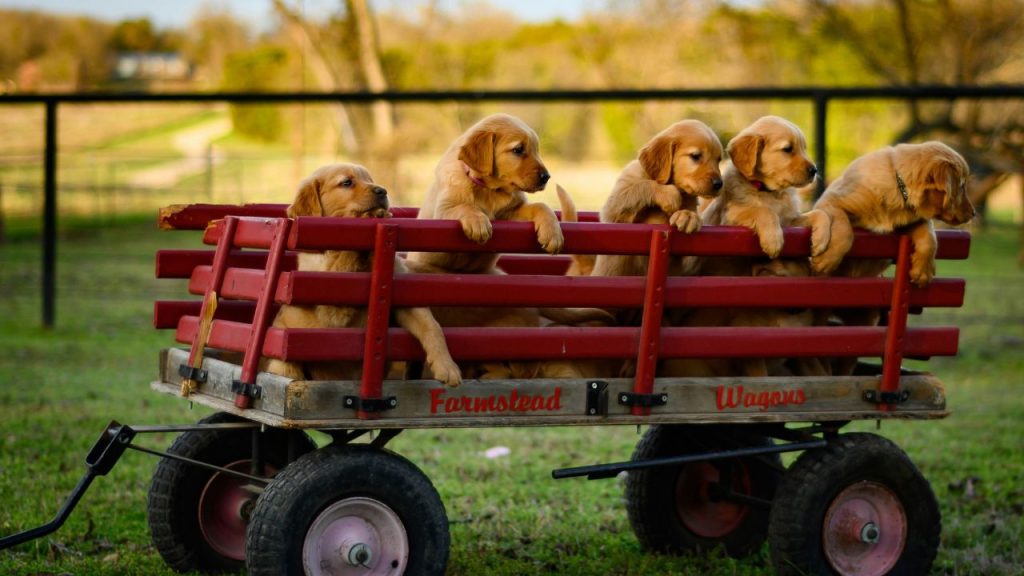The First Few Weeks of Life
A puppy’s journey begins in the warmth and safety of its mother’s care. Born blind and deaf, puppies rely completely on their mother and littermates for nourishment and comfort. During the first two weeks, their primary activities include sleeping, eating, and cuddling. Around the two-week mark, puppies begin to open their eyes and slowly start to explore their surroundings.
By the third or fourth week, their personalities start to emerge. They begin to interact more with their littermates, and playtime becomes a key part of their development. Biting, pouncing, and chasing are not only adorable but also essential for learning social cues and building coordination.

The Importance of Socialisation
Between the ages of 3 to 14 weeks, puppies go through a critical socialisation period. This is the best time to gently expose them to different people, other animals, sights, sounds, and environments. A well-socialised puppy is more likely to grow into a confident and well-adjusted adult dog.
Introducing a puppy to new experiences during this window doesn’t mean overwhelming them. Rather, it means providing safe and positive exposure. For instance, taking them on short car rides, having them meet calm children, or letting them explore different textures like grass, sand, and pavement can all help build their confidence.
The First Few Weeks of Life
A puppy’s journey begins in the warmth and safety of its mother’s care. Born blind and deaf, puppies rely completely on their mother and littermates for nourishment and comfort. During the first two weeks, their primary activities include sleeping, eating, and cuddling. Around the two-week mark, puppies begin to open their eyes and slowly start to explore their surroundings.
By the third or fourth week, their personalities start to emerge. They begin to interact more with their littermates, and playtime becomes a key part of their development. Biting, pouncing, and chasing are not only adorable but also essential for learning social cues and building coordination.

Choosing the Right Puppy
Choosing a puppy is an exciting but important decision. Each breed—and even individual puppies within a litter—can have different energy levels, temperaments, and needs. For example, a Border Collie might be a great match for an active household that enjoys hiking and agility training, while a Cavalier King Charles Spaniel might suit a quieter, more laid-back lifestyle.
Beyond breed characteristics, it’s essential to consider the time, patience, and effort required to raise a puppy. They need consistent training, plenty of exercise, and lots of love. Adopting from a shelter or rescue can also be a rewarding option, as many puppies (and adult dogs) are in need of a second chance.
Training and Bonding
Puppy training is as much about building a relationship as it is about teaching cues. Positive reinforcement—rewarding good behavior with treats, praise, or play—is the most effective and humane training method. Puppies quickly learn to associate actions like sitting, coming when called, or waiting at the door with positive outcomes.
Consistency is key. Short, frequent training sessions are more effective than long ones. Crate training, housebreaking, and leash training are some of the early skills that will help your puppy grow into a polite and happy dog.
Training also strengthens the bond between puppy and owner. Through this process, trust is built, communication improves, and a lifelong friendship is formed.

The Health of a Puppy
Keeping a puppy healthy involves several key components: proper nutrition, vaccinations, routine vet visits, and preventive care. Puppies need a well-balanced diet formulated specifically for their growth needs. Feeding schedules should be consistent, and fresh water should always be available.
Vaccinations typically start at around six to eight weeks of age and continue every few weeks until the puppy is about four months old. These protect against dangerous diseases such as parvovirus, distemper, and rabies.
Regular deworming, flea and tick prevention, and discussions about spaying or neutering are also essential aspects of puppy care. A healthy puppy is more likely to grow into a strong, vibrant adult dog who can live a long, happy life.
The Puppy Zoomies and Growing Pains
Anyone who’s had a puppy is familiar with the “zoomies”—those sudden bursts of energy when a pup dashes around the house or yard in joyful chaos. It’s perfectly normal and a sign of a healthy, happy dog. While these moments are hilarious and endearing, they also highlight the importance of daily exercise and mental stimulation.
Puppies grow quickly, and just like human children, they experience teething, awkward phases, and bursts of independence. Chewing is especially common during teething and should be redirected to appropriate toys rather than discouraged entirely.
Patience is vital. No puppy is perfect, and there will be accidents, chewed shoes, and moments of frustration. But the reward is more than worth it—a loyal companion who loves unconditionally.

Puppies and Children
Puppies and children can be a magical combination, offering each other lessons in empathy, responsibility, and joy. That said, supervision and education are important. Children should be taught how to approach and handle a puppy gently, and puppies should be socialized to the unpredictable nature of young humans.
When done right, this bond can become one of the most rewarding and lasting relationships in a child’s life.
A Lifetime of Companionship
Though the puppy stage is full of excitement and chaos, it passes quickly. In what feels like the blink of an eye, the tiny, clumsy ball of fluff becomes a graceful, loyal adult dog. But the early months set the tone for a lifetime of love and friendship.
Puppies remind us to find joy in small things—a game of fetch, a cuddle on the couch, or a nap in the sunshine. They ask little and give so much. And as they grow, they become not only our pets but our protectors, our workout partners, our emotional support, and, for many, a beloved member of the family.

Final Thoughts
There’s something timeless and universal about the love between a puppy and their human. It’s a bond rooted in trust, loyalty, and shared adventures. While raising a puppy is undoubtedly a big responsibility, it’s also one of life’s most heartwarming and fulfilling experiences.
So whether you’re cuddling a sleepy pup after playtime or teaching them their first “sit,” know that every moment you invest in your puppy’s life helps shape a friend who will be there for you through thick and thin—for walkies, for belly rubs, and for everything in between.

